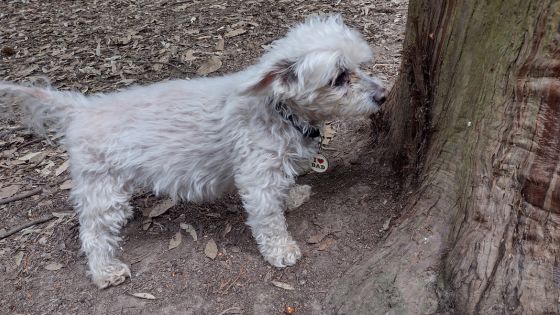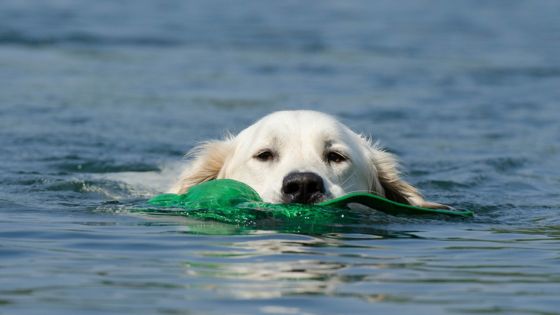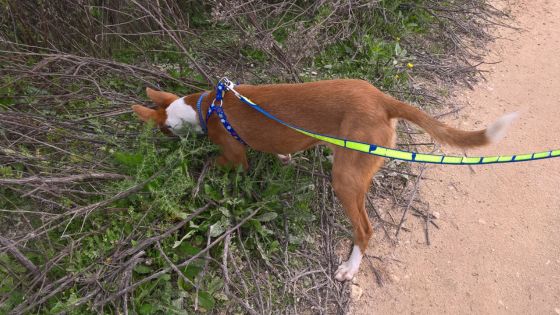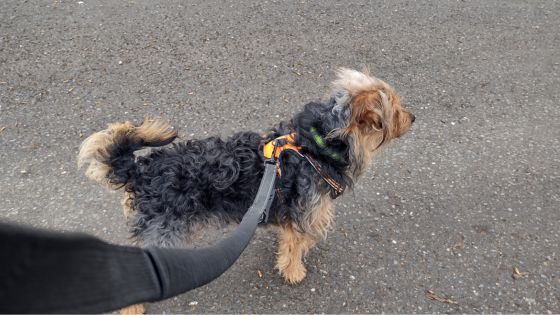The last two senior dogs I fostered were so mobile, it was hard for me to keep up on walks. They walked so far and so fast, I loved seeing how age hadn’t slowed them down…and they were both 11! However, the same cannot be said for every older dog.
Swimming is one example of a gentle exercise that can benefit not only less mobile senior dogs, but dogs of all ages.
Why Some Dogs Become Less Active as They Age
• Vision and/or hearing loss can make a dog less confident and even fearful of going out
• Dementia can cause confusion, making it scary for them to be outside of the familiar
• Joint pain can make walking painful
• Weight gain – due to no or few walks because of joint pain, or being fat from overfeeding, making it uncomfortable to move much
• Heart and/or lung problems
• The popular but mistaken belief older dogs don’t need or want to go out, and prefer lying in bed. Take note of what happens as a result of this belief: The dog doesn’t get taken out = they get bored and depressed so they lie on their bed all day = their human sees this and is validated. The problem is, they’re wrong and the dog suffers
The Consequences of Inactivity
- Weight gain
- Boredom
- Depression
- Joint stiffness
- A host of other health issues, just like humans suffer

How Your Senior Dog Will Benefit from a More Active Lifestyle
Not only will the consequences mentioned above be less likely to occur (although of course it’s impossible to say they never will), there are other added benefits –
- The chance to socialise and make new friends
- Avoid depression and boredom
- Mental stimulation which not only helps expend excess energy, but could stave off canine cognitive dysfunction (doggie dementia)
- Improves and maintains muscle tone
- Helps maintain a healthy weight
- Improves quality of life
See a Canine Physiotherapist
One way to get an exercise routine for your senior dog, is to have a professional tailor make one for him or her.
Do a search for professionals in your area simply by typing canine physiotherapy and the name of your city or town.
9 Gentle and Low Impact Exercises for Senior Dogs
The daily walk
Take shorter walks a few times a day, and keep to a gentle pace. If walking in a park, be careful of holes and uneven surfaces.
If extra assistance is needed, a lifting or Help ‘em Up harness can make a big difference.

Swimming
Swimming is a great choice for older dogs because:
- It’s low impact
- Supports your dog’s weight so there is no stress, strain or impact on joints
- Beneficial for cardiovascular health
- Keeps him at a healthy weight
- Access to an indoor pool means your pup can swim year round
Outdoor swimming should be limited to very warm weather, and your dog dried off quickly to avoid a chill.
For some dogs it’s an easier form of exercise than walking but be careful not to let him overdo it.
Supervise him at all times in case he gets into trouble and needs help.
If your dog doesn’t want to get in the water don’t force him, no matter how beneficial you believe it to be. Perhaps you should bring your bathing suit and jump in, that may be all the motivation he needs!
How easy is it for him to get in and out of the pool? A ramp with a gradual incline may help.
In some places you can even find indoor pools so swimming doesn’t have to be limited to the warmer weather
Walk around the house
For those times when your dog can’t get out for a walk, how about a stroll around the house? If you live in an apartment, a couple of laps up and down the hallway will make a nice change.
Visit a Pet Friendly Store
Walk at a pace that suits your dog, and get some shopping done at the same time!
Set Up an Obstacle/Agility Course
The great thing about an obstacle course is, you don’t need a lot of room. Chewy, Amazon and other online retailers have a variety of equipment to choose from or if you prefer, go the DIY route.
Throw a couple of pillows on the floor for your dog to walk between, or buy orange cones in the dollar store.
Rest each end of a broom on a couple of bricks or bowls turned upside down, then let him step over it.
Make a tunnel using blankets, or take a cardboard box and cut the ends off.
Hold a hula hoop and have your dog walk through it. How high off the ground will depend on his or her mobility.
Doga
Doga is a gentle exercise that can help boost your dog’s circulation. It also encourages your dog to stretch which can help with flexibility and range of motion.

Nose Work/Scent Work
Nose work is a great way to provide your dog with physical and mental stimulation. It’s as simple as hiding things around the house and asking your dog to find them. At first let him see where you’re hiding it, then make it a bit more challenging. To keep it gentle, hide things close to where he hangs out.
Play Hide and Seek
This is pretty much the same as nose work, only this time he has to find the person.
Play a Slow Game of Fetch
Roll the ball a short distance and let him fetch. It will get him moving, and it makes a change from just a regular walk.
Which gentle exercises do you think your dog will enjoy? Let me know in the comments below!
I’m excited to announce my new Senior Dog Care Support Service.
I offer 1:1 support on everything from health & wellness advice and training tips, to preparing to say goodbye and grief counselling. You can find details on all the packages I offer by visiting the Senior Dog Care Support Service page. If you have any questions or would like to book your FREE 15 minute chat, please email hpearson141@gmail.com
I’ve been rescuing and caring for senior dogs since 2009. From vision and hearing loss to obesity, dementia, kidney disease, liver issues, cardiac problems, Cushing’s, mobility challenges and more, you could say I’ve dealt with and learned a lot! In addition to my hands on experience, I’ve taken many courses and earned several qualifications to keep learning how to help senior dogs and they include: Senior Dog Enrichment, Understanding Canine Anxiety, Care of the Senior Pet and I’m a Certified Pet Loss Specialist.

